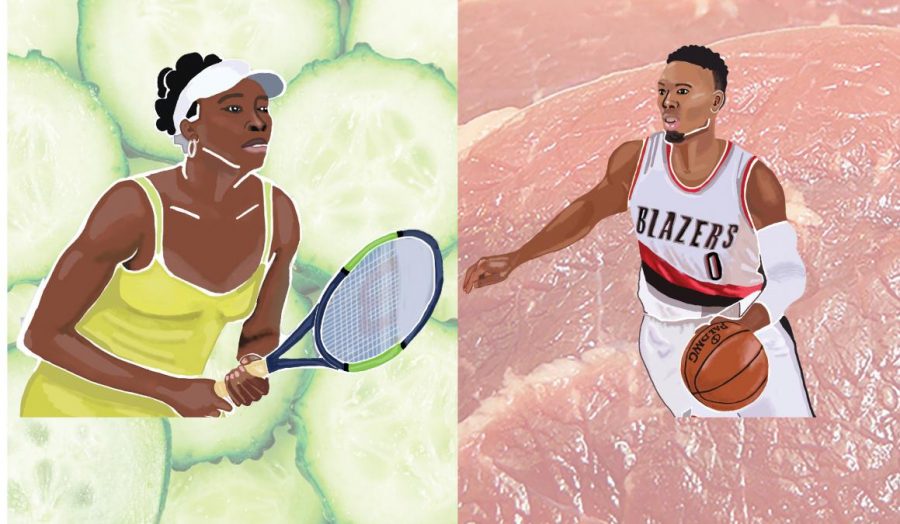PLANT BASED vs PLANT WASTE
COLUMN
October 14, 2020
PLANT BASED: Vegan or plant-based diets are superior, especially for athletes
By Hailey Beck and Sofia Leva
Grass. Leaves. Flowers. These “foods” are what most people think vegan people eat. Heck, memes circulating through social media credit the vegan diet as the cause for deforestation, seemingly accusing vegans as tree eaters. If society had a favorite punching bag, you would see the face of veganism on it.
But the characterization of vegans in popular culture could not be further from reality. Most of the time, you can’t even notice if someone’s adopted a vegetarian or vegan diet, until they politely decline a dish with meat or animal products. And despite all the bad press, the movement is growing as people have begun to realize the inherent truth and goodness of the vegan diet. Laugh in our faces and taunt us all you want about how savory and delicious bacon is, but you won’t be laughing when you have colon cancer at just 45 years old.
The general health benefits of the vegan diet include a lower risk of heart disease, cancer, diabetes. Furthermore, a vegan diet will help you lose weight, something that should be strived for especially considering the current rates of obesity in the US.
What’s more, if veganism was bad, why would the world’s premier athletes, with teams of nutritionists working around the clock to get the best fuel into their bodies, turn to a vegan diet? Why would the athletes at the top of the game like Tom Brady and Lionel Messi embrace this way of life?
You see, the switch to veganism does not only bring about long-term general health benefits, but it actually improves athletic performance, and as such, every serious athlete should become vegan. For example, the vegan diet has been proven in countless studies to reduce cholesterol levels. While this is obviously good for preventing cardiovascular diseases, the benefits of low cholesterol do not end there.
Low cholesterol also improves blood viscosity, which helps more oxygen reach the muscles, improving athletic performance. Also, low cholesterol reduces the risk of inflammation, which negatively impacts athletes’ recovery.
Separately, the plant-based diet is much higher in antioxidants, which neutralize free radicals. According to Harvard.edu, free radicals, aside from causing several diseases, also lead to muscle fatigue.
There are obvious drawbacks of the vegan diet, like its cost and the difficulty in getting nutrients one would primarily get from animal products, like protein and vitamin B12. However, there are many supplements available, such as vegan protein powders that help athletes get the correct amount of nutrients that they need in order to build muscle and maximize their performance. Clearly, the vegan diet by itself is not perfect, but to ignore the supplements available to vegan athletes is disingenuous.
Without a doubt, science backs the vegan diet, especially when it comes to athletes. Sadly though, there simply aren’t enough studies out there that analyze the differences between the athletic performance of vegans and non-vegans. Let’s look at some testimonials.
Tennis star Venus Williams is one famous athlete who adopted a vegan diet and has talked about it at length. After trying it out in 2011, she never looked back because she felt that it not only helped her performance on the court, but made her feel more healthy. Also, co-captain of the USWNT Alex Morgan is vegan, and she cites that lifestyle change as a big reason for her performance in leading the team to yet another World Cup Championship in 2019. It’s clear that anecdotally athletes benefit tremendously from switching to a vegan diet. Hopefully as more take of faith they will also discover the wonders of veganism.
As mentioned earlier, society has put down vegans for far too long. So if you ever find yourself in the ring with a vegan, thinking that this leaf eater is going to be easily defeated because they don’t get protein, watch out, because vegans will punch back — hard.
PLANT WASTE: Relying solely on plant products puts competitors at a disadvantage
By Liam Nagesh
Wildfires consume the Western states, turning our sky from blue to an orange, dystopian hue. Sea levels rise, hurricanes grow in number and strength and the world’s ice caps are melting. The evidence is overwhelming; climate change is real with severe adverse effects on the planet. That, or the Day of Judgement is upon us.
Prompted by this tangible evidence, many people have sought a solution to reduce carbon emissions. Strategies include switching to renewable energy sources and to more energy efficient cars, or more controversially, to a plant-based diet — in other words becoming vegan.
Nobody likes vegans. They show up at potlucks with disgusting food and can’t stop talking about themselves and their switch to a plant-based diet. They are zealots preaching about the path to enlightenment, but don’t seem to understand that their lifestyle is based more on faith than facts. But what’s wrong with faith if it’s not harming anyone, right?
Wrong, because it is harming people, especially athletes. The rise in plant-based diets amongst the general population has been mirrored in the sports world, as athletes like Tom Brady and Lionel Messi tout it as the holy grail to longevity and better recovery. Next thing you know, kids around the world, who want to be the next GOAT will be imitating these role models and their unhealthy lifestyles.
Plant-based diets are endorsed for their supposed benefits, but those benefits are not driven by the diet. Everyone seems aware of the need for protein in an athlete’s diet for muscle building, but promoters of plant-based diets avoid the topic of protein quality, not just quantity, that is how well we absorb the proteins that we eat. Scientists use a metric called the Digestible Indispensable Amino Acid Score (DIAAS) to measure protein digestibility.
According to researchers at the University of Illinois, animal based sources far outstrip plant based sources when it comes to the quality of protein. For example, a single hard boiled egg has a score of 1.13, while the closest plant based product, soy flour, has a measly score of 0.89. Not even considering the challenges to simply get enough protein with a plant-based diet, the quality of such protein is vastly inferior, which has severe, negative impacts on the muscle growth of athletes.
Having proven that those who opt for a plant-based diet struggle to build muscle, what about those highly touted claims that it reduces recovery times and increases athlete’s longevity? The reality is that most athletes who switch to a plant-based diet go through a brief honeymoon phase, where their performance and recovery increase, followed by a steep decline.
This decline can be attributed to a couple of factors, namely that when athletes switch to a plant-based diet, they are typically switching from a diet primarily consisting of unhealthy items like fast foods and processed foods to a diet that strictly features whole foods, which are indubitably better for athletic performance. However, their performance level eventually drops because the missing nutrients in plant-based diets can only be found in sufficient amounts in animal products, such as taurine and calcium which severely impact recovery.
But don’t just take the nutritionist and biological arguments, which are based on sterile lab experiments. Let’s look at athletes in the real world too; perennial NBA All-Star Damien Lillard stopped his vegan diet in 2018 after losing 17 pounds in 5 months. New England Patriots quarterback Cam Newton, who switched to a vegan diet in February of 2019, has been unable to stay healthy in the NFL since then. The athletes who make the switch see a decline in play, and inevitably revert back to eating meat or flame out.
So it’s obvious that for professional athletes, a plant-based diet just won’t cut for their athletic performance. But what about climate change? Aren’t there reasons more important than athleticism to be vegan?
Sure, some emissions come from the meat industry, but nowhere near the amount that comes from the frequent flying that athletes do during their seasons. Also, self-limiting your athletic potential in the name of morality, while understandable, isn’t the best career advice. While plant-based lifestyles require faith to succeed, for athletes, they are just a myth.












Chelle • Feb 13, 2021 at 6:52 am
Where are your scientific studies to back your claims? I prefer the facts presented by world renowned scientists from studies that have been performed over many years with large numbers of populations. Studies that have been duplicated and yielded the same results over and over. True medical experts in their field. What are the credentials of the authors of this article? Please share and compare with the likes of Dr. Caldwell Esselstyn and Dr. T Colin Campbell.